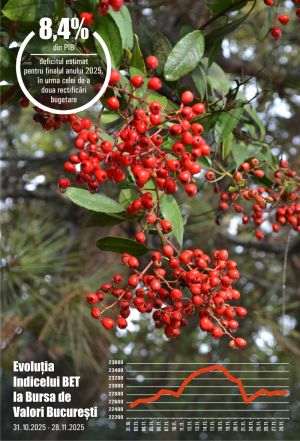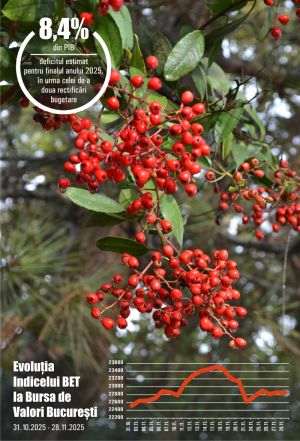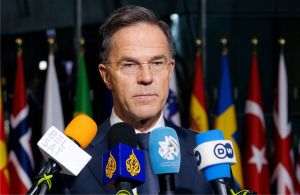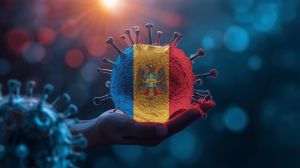The schedule of the easing restrictions announced by the government for the summer season, depending on the national vaccination campaign and the case rate concerning the current pandemic represent a warning for specialists in the field. Epidemiologists claim that the easing measures do not exclude protection ones, and in order to avoid facing a situation similar to that of last year in autumn, there needs to be a balance between these measures and the acceleration of the national vaccination campaign.
In order to find out what the expectations are for this summer season and what we could be faced with, come autumn, we have conducted a brief interview with epidemiologist Adrian Marinescu, medical director of the Matei Balş National Institute.
Reporter: The loosening approved by the government at the end of last week has created the sensation that the end of the pandemic is close. Can we think of that at the moment?
Adrian Marinescu: First of all, we need to make a distinction between the decrease in the number of infections and the end of the pandemic. The end of the pandemic isn't a door that gets closed right away, it is about going through stages. The pandemic doesn't disappear completely, it shrinks to a regional level, local, before disappearing. Nobody said that we are going to return immediately to the situation before the pandemic. The situation is good now, but we need to be ready for autumn, because we don't know what will happen once the cold season begins, what the situation will be, especially in the context of the new strains.
Reporter: Outside the vaccination campaign, what insurance do we have that everything that has happened last summer, won't happen this year and we will not be facing a new exponential rise in the incidence rate?
Adrian Marinescu: Certainly, we have no guarantee that what happened after the summer of 2020 will not be repeated. Through this loosening, we are trying to find the middle ground. Those measures do not mean that prevention is being waived. It is very difficult to say what will happen in the autumn, if there will be a fourth wave, how great it will be, or if we will only face a passing period in terms of the slight increase in the number of cases.
This depends very much on the continuation of the vaccination campaign, the interferences brought by the new strains, compliance with the protection measures, even if loosening of restrictions occurs, maintaining a balance between all of the aforementioned factors.
Reporter: From the epidemiologists' point of view, is the vaccine enough to protect us against Covid-19? What is, according to the latest studies, the length of the immunity provided?
Adrian Marinescu: No vaccine provides a 100% effectiveness. What is important is for this vaccination campaign to take place in the short term, to produce the expected immunity effect, which is double through antibodies and the memory cells that will protect us. As far as the immunity provided is concerned, according to recent information, that ranks somewhere between 8 and 12 months. That is why the drug manufacturers claim that a certain dose would be needed, after that period.
Reporter: Can the existing vaccines deal with the new Sars-Cov 2 strains? Because lately, there is talk about the need to take a new shot after six months.
Adrian Marinescu: From the information we have, there are no major interferences of the new SARS-COV strains 2 with existing vaccine variants. These vaccines even have effects on new strains, even if their effectiveness is lower, but there are no discussions on their usefulness. There are indeed, discussions about the need for the third dose. If an update is needed, it will happen, because the application of the third dose does not only refer to the duration of immunity, but also to catch new mutations.
Reporter: Major companies have announced that this autumn they will start vaccinating children. Why is there a need to vaccinate minors as well, if the herd immunity is acquired following the vaccination of adults?
Adrian Marinescu: Herd immunity is not that easy to achieve. For that, what is necessary is the need to immunize 70% or even 80% of the population. Minors' vaccination does not only concern the extended vaccination. Children can be vectors for the transmission of the virus to the vulnerable persons, that have a high risk of contracting the disease, and do not want to vaccinate. Then, even if children get light variants of the disease, it is not out of the question to see, like we have seen in the last year, the manifestation of an explosive version of the disease, that puts their life in danger. That is why the minors' vaccination is needed.
Reporter: Experts in the field have warned about the inevitability of a fourth wave of the pandemic. When could this occur in Romania?
Adrian Marinescu: We are talking about autumn, meaning mid-September-mid-October. In order to get through that period more easily, we are very interested in what will happen in the summer season after the taking of all the easing measures, as well as how the national vaccination campaign will continue. Then, other mutations will continue to appear. We don't know what intensity the fourth wave will have, because it all depends on the factors enumerated above.
Reporter: Given the anti-Covid vaccination, is the anti-flu vaccine still needed in mid-autumn?
Adrian Marinescu: Definitely so, because they are completely different things. There might be a combined vaccine, if the need for a third dose arises, in autumn. But it is necessary for the vulnerable people to get the flu vaccine in autumn as well, because in the event of contracting the both viruses, they can catch a severe form of the disease.
Reporter: When will we see the first signs of the return to normal?
Adrian Marinescu: Please note, we are interested in the permanent return to normalcy. The closing of the pandemic is not easy, it will be done in stages. 2021 is a transition year and depending on what happens this autumn, we will discuss the closing of the pandemic in 2022.
Reporter: Will the pandemic close in the first semester of 2022 or in the second half?
Adrian Marinescu: I repeat, it all depends on what will happen this autumn.
Reporter: Vaccinated or unvaccinated? It would seem that the majority of people will only be accessible to vaccinated people.
Adrian Marinescu: In terms of principles - such a difference shouldn't exist because it means discrimination. Ideally, from my point of view, we all ought to be vaccinated, to protect ourselves, but also to protect those around us. But we need patience, we need to perceive the current situation as a very good thing, but one which we need to manage with moderation, particularly during the summer season.
Reporter: Thank you.























































